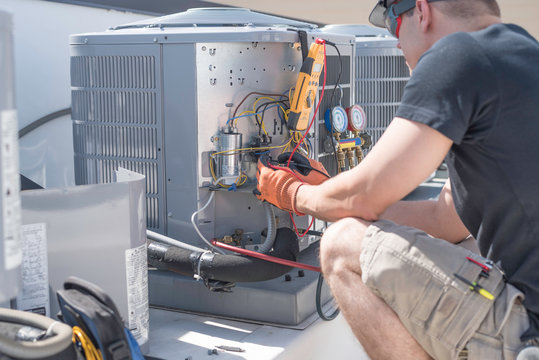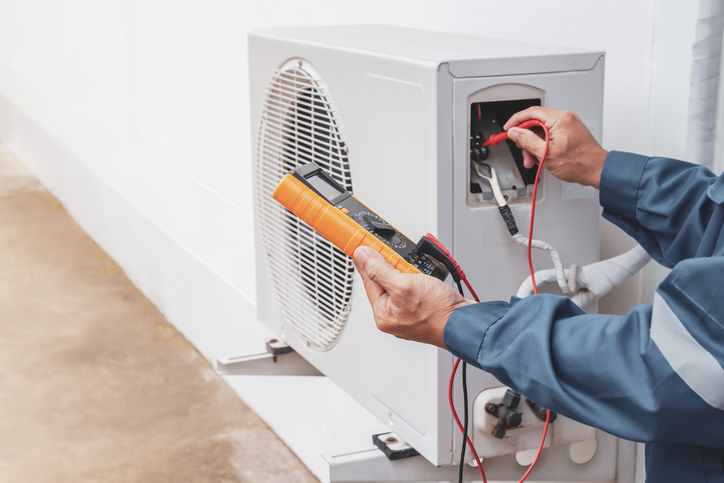The Value of Cooling And Heating Knowledge: Uncovering Reasons For Air Conditioner Problems for Property Owners
Property owners commonly overlook the significance of understanding their a/c systems. Recognizing typical indications of air conditioning problems can lead to prompt interventions. Issues like insufficient cooling or uncommon sounds are not simply nuisances; they can suggest deeper worries. By checking out the origin of these troubles, home owners can boost system effectiveness and prolong its lifespan. What are the most prevalent issues that can emerge, and exactly how can they be successfully dealt with?
Typical Signs of AC Troubles
How can homeowners identify concerns with their a/c systems before they escalate? Recognizing usual indications of air conditioning problems is essential for prompt maintenance. One widespread sign wants air conditioning; if the air conditioning unit falls short to lower the interior temperature, it may signal underlying concerns. Unusual sounds, such as grinding or hissing, can also indicate mechanical failings or loose elements - ac fix. Furthermore, property owners should watch out for strange odors rising from the system, which could recommend mold growth or electric issues. Constant cycling on and off, recognized as short biking, can show thermostat issues or refrigerant leakages. A rise in power bills without a corresponding increase in usage might aim to inadequacy. By remaining sharp to these caution signs, house owners can protect against more substantial issues and expensive repair services, guaranteeing their cooling systems operate effectively throughout the warmer months

Recognizing Refrigerant Issues
Refrigerant problems can substantially influence the efficiency of a cooling and heating system. Property owners must understand the signs of low cooling agent degrees and the importance of spotting cooling agent leakages. Addressing these issues immediately can stop more damage to the system and assurance optimal cooling efficiency.
Reduced Cooling Agent Levels
A common concern that homeowners might run into with their a/c systems is low refrigerant levels, which can significantly impact the system's effectiveness and efficiency. Cooling agent is crucial for the cooling procedure, soaking up heat from indoor air and releasing it outside. When degrees go down, the air conditioning unit struggles to cool the space effectively, causing boosted energy consumption and potential system pressure. Symptoms of reduced cooling agent consist of insufficient cooling, longer run times, and ice formation on the evaporator coils. Property owners may additionally observe uncommon sounds as the compressor works harder to make up for the deficiency. It is essential for homeowners to understand the relevance of preserving correct refrigerant levels to guarantee peak cooling and heating performance and long life.
Refrigerant Leaks Detection
Where might a home owner begin when encountered with the possibility of cooling agent leakages in their heating and cooling system? The initial step entails keeping track of the system's performance. Signs such as reduced cooling down efficiency, ice development on coils, or hissing audios may show a cooling agent leak. Home owners need to likewise examine for visible indicators of oil residue, typically an indicator of a leak. Using a cooling agent leak detector can provide more exact identification. If uncertainties persist, consulting an accredited HVAC service technician is important, as they have the competence and equipment to find leakages efficiently. Motivate discovery and repair of refrigerant leakages not just enhance system effectiveness yet also prevent possible ecological harm, making it a vital facet of a/c upkeep.
Electrical Failures and Their Effect
Electric failures can considerably influence HVAC systems, particularly with concerns like circuit breaker malfunctions and damaged electrical wiring. These issues not only disrupt the system's performance yet can also result in expensive repair services and safety and security dangers. Recognizing the effects of such failings is vital for property owners to maintain an efficient and safe heating and cooling environment.
Circuit Breaker Issues
How can breaker concerns influence the effectiveness of an a/c system? Circuit breakers serve as important safety and security gadgets that manage electrical circulation to cooling and heating devices. If a breaker journeys often, it disrupts power supply, leading to irregular heating or air conditioning. This can trigger considerable stress on the system, resulting in inefficient operation and possible damage to components. Home owners might observe enhanced power expenses due to the heating and cooling system's struggle to keep preferred temperature levels. Furthermore, repeated interruptions from stumbled breakers can shorten the life-span of the air conditioning system, requiring expensive fixings or replacements. Normal upkeep of circuit breakers is critical, as it ensures a secure power supply, eventually enhancing the general efficiency of the a/c system.
Faulty Wiring Outcome
Regularly neglected, damaged wiring can have dire repercussions for HVAC systems. Electrical wiring concerns may bring about short circuits, causing frequent break downs and raised fixing prices. Additionally, incorrect wiring can trigger ineffective energy usage, leading to higher utility expenses and pressure on the system. In extreme cases, defective wiring can trigger electrical fires, presenting a significant safety risk to homeowners. These electric failings can damage A/c elements, resulting in expensive replacements or substantial repair work. Home owners need to focus on routine evaluations by certified professionals to recognize and fix circuitry issues before they intensify. Comprehending the ramifications of faulty wiring can aid ensure the long life and safety of cooling and heating systems, inevitably protecting both the home and its passengers.
Clogged Filters and Their Consequences
While many property owners may ignore the importance of normal filter maintenance, clogged up filters can bring about significant repercussions for heating and cooling systems. When filters come to why not look here be blocked with dirt, dust, and debris, air movement is limited. This decrease in air flow forces the system to function harder, leading to boosted energy intake and potentially greater utility bills. Over time, this pressure can cause damage on components, leading to early system failing.
In addition, clogged up filters can endanger interior air top quality. Toxins and allergens may flow throughout the home, exacerbating respiratory system issues and allergic reactions for residents. Furthermore, poor air flow can trigger the evaporator coil to freeze, causing pricey fixings and ineffective air conditioning efficiency. Frequently transforming or cleansing filters is a simple yet crucial maintenance job that can help ensure the durability and efficiency of cooling and heating systems, ultimately profiting both the property owner's comfort and their funds.

Thermostat Malfunctions Discussed
What happens when a thermostat malfunctions can significantly affect both convenience and energy effectiveness in a home (HVAC company). A damaged thermostat might fail to precisely review the temperature, resulting in overcooling or not enough air conditioning. This discrepancy can create pain for passengers and lead to higher power costs, as the gas furnace service cooling and heating system works tougher than required
Typical concerns consist of dead batteries, which can provide digital thermostats defective, and loose electrical wiring that interrupts interaction in between the thermostat and the cooling and heating system. Furthermore, obsolete or badly adjusted thermostats may not respond correctly to temperature adjustments, further exacerbating power inefficiency.
Homeowners should be vigilant for indications of malfunction, such as inconsistent temperature levels or unforeseen power costs. Normal checks and understanding of the thermostat's performance can aid determine problems early, guaranteeing peak efficiency of the HVAC system. Addressing thermostat concerns quickly is necessary for keeping a comfy living environment and managing power usage successfully.
The Function of Normal Maintenance
Routine maintenance plays an important duty in making sure the durability and efficiency of heating and cooling systems. Home owners that focus on routine checks can prevent small issues from escalating right into costly repair services. Normal upkeep commonly consists of jobs such as cleaning filters, examining ductwork, and checking refrigerant degrees. These tasks assist preserve perfect air movement and system efficiency, lowering power consumption.
A well-maintained Heating and cooling system operates a lot more successfully, providing constant convenience throughout the home. Routine tune-ups can also prolong the lifespan of the unit, resulting in substantial financial savings over time. House owners are urged to schedule expert inspections at the very least yearly to identify possible issues early.
Additionally, several manufacturers call for normal upkeep to maintain service warranties, making this method not just advantageous yet commonly necessary. In general, recognizing the importance of regular maintenance equips house owners to safeguard their a/c systems against unexpected failures and see page boost their financial investment in home convenience.
Often Asked Questions
Just How Can I Boost My Air conditioning's Energy Effectiveness?
Improving an AC's power efficiency entails regular maintenance, cleansing or replacing filters, securing ductwork, making certain proper insulation, using programmable thermostats, and organizing specialist examinations to recognize and rectify prospective concerns affecting efficiency.
What Is the Life-span of a Regular Air Conditioning Device?
A normal a/c device has a life expectancy of 15 to 20 years, depending on maintenance, usage, and ecological factors. Regular maintenance can considerably expand its operational life and improve overall performance.
When Should I Replace My Air Conditioning System?
An air conditioning system should usually be replaced every 10 to 15 years. Signs for substitute consist of regular fixings, increasing energy costs, and inadequate cooling, showing that an upgrade might be extra cost-effective and effective.
Can I Troubleshoot AC Problems Myself?
Yes, people can repair air conditioner troubles themselves by checking filters, making sure power supply, and evaluating for noticeable issues (air conditioner repair). Intricate problems frequently require expert support for accurate diagnosis and safe fixing, ensuring excellent system efficiency.
Just how Do I Select a Reliable A/c Specialist?

To pick a trusted HVAC professional, one must seek referrals, check on-line reviews, verify licenses and insurance, evaluate experience, and request in-depth quotes to guarantee high quality service and reasonable pricing prior to making a choice.
Final thought
To sum up, a solid understanding of HVAC systems allows house owners to properly diagnose and resolve typical cooling problems. Acknowledging indicators such as inadequate cooling or climbing energy costs permits prompt interventions, which can substantially enhance system efficiency and durability. By staying informed concerning potential issues like refrigerant leakages, electrical failings, and clogged up filters, home owners can take positive steps to keep their systems, eventually ensuring comfort and advertising a healthier living atmosphere. Normal maintenance stays essential to this endeavor.